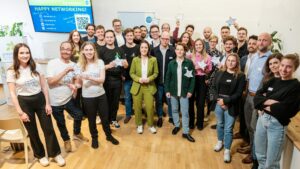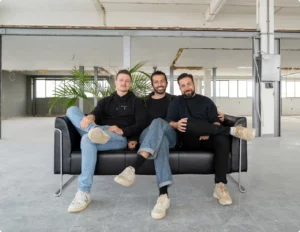Analysis: Are Bulgarian Cities Getting Smarter?

In short:
- Bulgaria’s capital Sofia is assessed to have a mid- to low-level of digital maturity and is well-positioned in terms of the state of development of its digital community and digital skills but lacks progress in open data, governance, support services, infrastructure, finance, and digital competences.
- Notable progress in the development of the urban and digital infrastructure of Sofia has been accomplished with the support of various EU-funded initiatives such as the GATE Institute of Excellence, WifI4EU, and Sofia Smart City Marketplace.
- Other Bulgarian cities, among which Burgas, Varna, and Stara Zagora are also focusing on developing their own digital infrastructure and using the potential of IoT solutions to gather and analyze data for better decision-making.
- There is an emerging smart city startup ecosystem in Bulgaria.
Real-time crime mapping, which uses AI-driven analysis to detect crime patterns, identify problematic zones and predict incidences of crime to help strategically plan directed patrols. Such a tool for better resource deployment decision-making, ShotSpotter, is already operational in New York, while in France, the IoT startup Sigfox is measuring the air quality, detecting available parking spots, and informing city authorities when a street light is out or when a dumpster is full. But how long is it going to take before similar solutions are implemented in the SEE region and Bulgaria?
With more than 72% of Europe’s population living in urban areas, it does not come as a surprise that the high density denotes challenges connected to insufficient interconnectivity, energy and climate change, water, air, and soil pollution. At the same time, however, this poses new opportunities for the creation of innovative ecosystems consisting of smart, green, and efficient initiatives by stakeholders from government, business, and academia. Or, put in other words, “smart cities” are the answer to the current urban challenges.
Liveable, sustainable, and prosperous
But what is actually understood under the term “smart city”? It means that IoT will make it possible for citizens and public officials to track materials and assets in real-time and use them smartly and efficiently. The opportunities for smart change are numerous: from smart energy, IoT distributed networks where households and factories generate their own electricity from renewable sources, using the excess space in the walls for wind and solar generation, to optimized mobility which will enable drivers to access real-time data and car-sharing schemes and mobile parking apps. The digital IoT city makes lives better for both citizens and officials as it allows more effective and data-driven decision-making, enhanced citizen and government engagement, safer communities, reduced environmental footprint, improved transportation, more efficient public utilities, and improved infrastructure.
Benchmarks in Europe and Bulgaria
In June 2020, TNW’s and fDi Magazine released their inaugural research and ranking Tech Cities Of the Future 2020/21 which collected data from 76 locations across Europe in order to select the top-performing cities – and Sofia was amongst them, ranked in the 20th place. The ranking is headed by London, Paris, and Dublin with Romania and Poland also occupying the front positions: Bucharest is placed on the 7th, while Warsaw is 15th.
Looking into some of the best smart city practices implemented in London, it is worth mentioning the Super Connected City project for developing a city-wide digital infrastructure consisting of a voucher scheme, public realm Wi-Fi, and Wi-Fi in public places. In Romania, the community network startup Public Square uses geolocation tracking to connect residents with each other and with local authorities, utility companies, and agencies to improve the quality of services. Warsaw has its own Virtual Warsaw platform which ensures accessibility and inclusiveness for the visually impaired. The virtual city is using IoT technology and is deploying a network of beacon sensors with next-generation Bluetooth and it has become a personal guide for the visually impaired citizens by allowing them to receive verbal or written info about their surroundings on their smartphones.
According to the 2019 Digital Cities Challenge report of the EU Commission, Bulgaria’s capital Sofia is assessed to have a mid- to low-level of digital maturity based on the input of stakeholders from city authorities, education institutions, industry and utility organizations, and level of digital transformation of the city on eight dimensions: community and digital skills, open data, governance, support services, infrastructure, finance, and digital competences. The results infer that Sofia is well-positioned in the dimensions of digital community and digital skills, but lacks progress in the rest six dimensions. The Assessment Report of the EU Commission’s 2019 Digital City Challenge identifies three sectors in the Bulgarian economy – government, utility services, and transportation – that represent a large potential market for e-services. On the side of the e-government sector, the key demand players are the Municipality of Sofia and its transportation, urban planning, and e-government departments. As of now, the Sofia Municipality together with Sofia Investment Agency is working on the establishment of an Office of the Chief Data Officer (OCDO), led by a Chief Digital Officer, whose responsibility will be to introduce a system for data management and the policies and practices that ensure data is collected, stored, analyzed and shared consistently across the municipality and collaborating organizations. In the utilities sector, the key players are the Water Company Sofia, Ulichno Osvetlenie (Street Lighting Company), and Heating Sofia, while the companies able to digitize the sector are those who can offer smart-meter solutions, or real-time measurement of energy consumption by means of a digital metering device, as well as those which develop geographic information systems software for prediction, monitoring, and analysis.
Bulgaria’s first steps towards smart city
“The idea was to see what value we can add to the Bulgarian IoT industry and to identify a niche which in our case became the monitoring of the quality and state of air and water resources,” shares Miroslav Gechev, one of the founders of Develiot. Being one of the first smart city startups in the local ecosystem, Develiot was founded in 2018 as an intrapreneurial project, part of the big Bulgarian system integrator, Telelink Business Services. It provides IoT solutions for data collection and data analysis and develops hardware sensing systems to measure air quality in urban areas, track water meter consumption, and monitor water resources.
From then on the Bulgarian smart city ecosystem began gaining traction and in 2019, Sofia became home of the GATE Center of Excellence for developing technological and scientific expertise in the field of Big Data and AI. This research institute was established in a joint effort by public institutions and academia from Bulgaria and Europe and is the first of its kind in the Balkans. Having managed to secure €15 million in funding from the EU’s Horizon 2020 program, GATE will allow scientists, business leaders, and innovators to develop new smart solutions in three modern tech laboratories – for modeling the processes in the urban environment (City Living Labs), for interdisciplinary cooperation with the industry (Digital Twin Lab) and for VR and Big Data visualization (Open Visualization Lab). The Digital Twin project envisions the creation of an exact virtual model of the real city which would allow for experimentation with different solutions and changes without them being practically implemented. The point of that will be to assess the outcome of taking certain actions and decisions concerning the urban environment beforehand and minimizing the risk of making mistakes and inefficient investments.
Notable progress in the development of the urban infrastructure of Sofia in 2020 was also the implementation of the WiFI4EU initiative financed by the EU Commission. The main goal of the project is to ensure free public access to wireless internet in the most visited urban areas such as parks, squares, public buildings, and libraries across Europe. Sofia installed 22 hubspots for wireless access with 100 Mbit/s which are managed and monitored by a special portal by a portal in the Municipality.
Another smart city initiative in the capital implemented with the support of Cluster Sofia Knowledge City is the Sofia Smart City Marketplace platform, which is already a beta version. The platform aims to serve as a digital space for publishing, storing, and open access to a database of validated and ready-to-validate product and tech innovations that can be used in the smart city transformation of Sofia. The initiative is designed to help officials who are responsible for the development of the smart city to easily find information on the latest products, applications, and tech solutions.
Smart city efforts outside Sofia
Moving away from the capital and looking into other promising Bulgarian future smart cities, Burgas is recognized to be the perfect “pilot city” for the implementation of the first 5G city-wide network in the country. The marine city, which is currently focusing on the development of its own urban dashboard which will monitor, assess and optimize investment plans and the delivery of public services, has already implemented its flagship digital project, smartburgas.eu, which offers real-time data about the city’s air quality, traffic, and waste management. Burgas has also developed smart interactive mobility terminals and a mobile app to make traveling easier and more convenient. This allows travelers to access real-time information about bus timetables. the events in the city, and weather. Burgas is also installing smart lamp posts fitted with LED bulbs and a reactive dimming system to save street lighting energy with some of the lamp posts being equipped with sensors for measuring the levels of noise, pollution, and traffic. The city recently finished the development of its urban dashboard – an initiative funded by the European Regional Development Fund which built on existing digital infrastructure and integrated collected data sets from the municipality and other city partners in order to monitor, assess and optimize public investment, and service delivery.
The marine city of Varna is also working on developing its Smart Cities Information System (SCIS), but unlike in Burgas, where the focus is on sharing knowledge and know-how and on collaboration in the creation of smart cities. The platform unites project developers, research institutions, industry experts, and citizens from across Europe in order to outline to life best practices and lessons learned from smart projects.
“If you want to develop an ecosystem of startups and scaleups, especially in urban tech, it’s important that projects happen not only in the top three cities in a country but in the next ten or fifteen cities. The local governments should clear the path and processes for startups to participate.” explains in an interview for Trending Topics SEE the Managing Partner of Urban Impact Ventures, Hans van Houwelingen. He concludes that before the urban tech ecosystem in Bulgaria reaches the levels of Western European countries, there needs to be a shift in the distribution of funding which is currently cascading down to larger cities and hardly reaching the smaller cities. As in every industry, there are innovators, early adopters, early majority and late majority and startups should aim to identify which are the innovators and early-adopters in the face of municipalities, mayors, and public officials. Gechev shares that so far Sofia, Burgas, and Stara Zagora were the key innovative cities but now more municipalities start seeing the value of the smart city industry. “They realize that it will be cheaper to collect data now rather than to acquire it at later stages,” he concludes. According to him, however, from the point of view of an early-stage smart city startup that wants to test its solution, convincing the early-adopting municipality to provide you with the opportunity to test your solution using their infrastructure and their assistance is the easy part. The difficult part comes at the time when the municipality assesses the value of your solution and has to find financing for it.
Lessons learned: startups need to be flexible with municipal partners and educate them
Miroslav Gechev shares that in the early stages of the development of Develiot, the main challenges they faced were related to the lack of initial traction in the Bulgarian smart city ecosystem: “Unlike in Denmark and Norway, there was no data to analyze as, first, no one was using sensors at that time and, second, there only existed legacy technologies”. He explains that this was the moment when the team of Develeiot realized the need to develop their own hardware, combine it with their data-analysis solution, and offer their clients an end-to-end solution for data-oriented decision-making. According to him, startups that offer end-to-end smart city solutions are in an advantageous position as they are offering extra value to their clients by making the digital transition easier. On the other hand, talking from personal experience, Gechev also outlines that the secret to success is not to confine the client with one rigid end-to-end solution. “If some municipality already operates with a smart city platform which had been implemented by another company, Develiot gives them only the sensor technologies and teaches it how to integrate them with its existing platform,” he explains.
“Besides the fact that the whole concept of IoT sounds attractive, in order to do something meaningful with it, it has to make financial sense for the end-user,” reveals Miroslav Gechev. This was one of the challenges that Develiot overcame by showing their clients a well-backed pitch explaining all of the benefits of investing in their smart city solution. Gechev shares that very often the municipalities are not financially prepared to invest in smart city solutions and it helps when startups go into discussion with a prepared plan from where the municipalities can receive funding, like for example selected EU programs and projects. “The other thing that is useful is to present what the expected return on the investment into the specific smart city solution would be – whether it is a monetary return on non-monetary return characterized in increased air and water quality,” he adds.
Miroslav Gechev advises smart city startups to work with partners which are already established players on the market such as various system integrators because they can add value to the operations and the sales cycles of the startups. Moreover, he shares that depending on how well funded one startup is, it may be reasonable for it to “buy” its first clients – offer them the solution for a price that is way less than the actual market price so that they can see the benefit. This is a model that has worked well for startups in the smart city industry abroad. However, what is important is not to give away your solution for free, so that there is still some involvement on the side of the client. As assessed by Gechev, the biggest competitors in the Bulgarian smart city market have legacy technologies and this puts new startups with more efficient, effective, and flexible solutions in an advantageous position. Moreover, there is an open collaboration between smart city startups which enhances the potential for the rapid development of the ecosystem.
Obviously, there’s a basis for smart city concepts to be implemented in Bulgaria. And even though it’s not often visible for the citizens and in everyday life, some processes have already begun. We counted over 20 stakeholders – companies, administrative institutions, and academia, who are currently trying to find a formula to collaborate. Will they find soon so pressing problems like water shortage, dirty air get solved and the regular Bulgarian citizen finally sees the advantage of having a local startup ecosystem? Will there be Bulgarian smart city companies who make it on the international market after successful domestic pilots? The optimism is here, remains to be seen whether also the will.




























